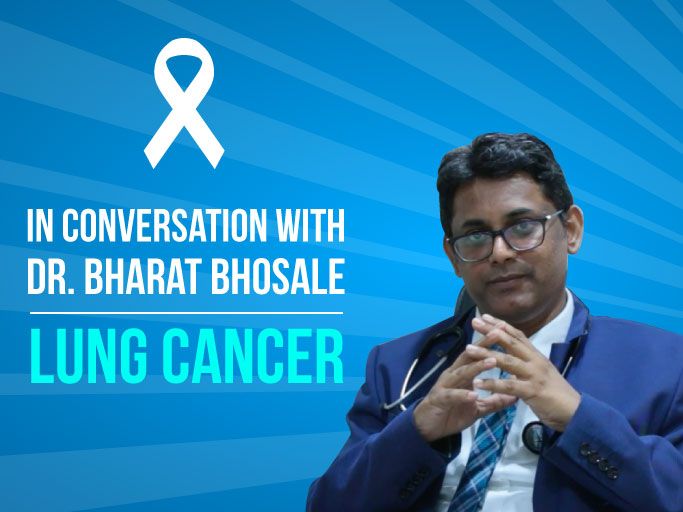Dr Bharat Bhosale is a senior medical oncologist at Onco.com who primarily practices at Mumbai with an expertise in lung, ovarian, breast and other cancers.
 He is a European Certified Medical Oncologist (ECMO) and holds a professional diploma in clinical research. In this interview, he specifically responds to lung cancer questions. From its earliest signs to different stages and their treatment, from the basic diagnostic tests to big questions like what happens when chemotherapy fails, Dr Bhosale has quick, comprehensive answers. Read on to find out more.
He is a European Certified Medical Oncologist (ECMO) and holds a professional diploma in clinical research. In this interview, he specifically responds to lung cancer questions. From its earliest signs to different stages and their treatment, from the basic diagnostic tests to big questions like what happens when chemotherapy fails, Dr Bhosale has quick, comprehensive answers. Read on to find out more.
When asked if cancer is curative, he says, ‘Cancer is not death. With all the treatment modalities, there are patients living longer. I must say, once cancer is diagnosed, the way of looking at life [for] the patient becomes more positive.’ Even for palliative care he assures that, ‘[Patients] have time in their hand, they know how much time they have, they live their life in a good way.’
1. The word ‘inoperable’ goes around a lot when it comes to lung cancer. Does that mean there is no hope?
Here, Dr Bharat Bhosale says that this depends on the stage of cancer. He goes on to say that the early stages of lung cancer are definitely operable, provided they are detected early. He even drops the solution for the metastasised disease where it is definitely ‘curative’ even if it is ‘inoperable.’ Watch the video to find out how.
2. Why do different people react differently to chemotherapy in lung cancer treatment?
Dr Bhosale emphasizes that everybody has a different gene pool and studies today are developing to customize precision treatment for each individual. Find out how.
3. Are clinical trials a safe resort for lung cancer treatment?
Dr Bhosale says that clinical trials are largely benefits. He also lists out the advantages that patients who sign up for advanced study treatments have over patients who opt for standardised treatment plans.
4. Do smokers need an annual screening for lung cancer? And if the smoker is diagnosed with the disease, what are some important pointers that is not too late to quit?
Smoking is certainly a risk factor for lung cancer and annual screening is recommended for early detection and to prevent cancer. Quitting tobacco has its definite advantages as it avoids the negative impact that tobacco has on both curative or palliative treatment.
5. There are some social stigmas associated with lung cancer. How can we help remove them?
Dr Bhosale also tackles the tough questions like how we help remove stigmas associated with lung cancer, on EGFR mutation and recent statistics on survival rates and even clarifies that documentation in India is rigorous only in metropolitans.
Dr Bhosale goes on to explain whether smoking cigarettes really is that much of a big deal, do smokers need annual lung screening, is it ever too late to quit and why some patients need chemotherapy over radiotherapy and why others need the reverse. Watch the video to find out more.



